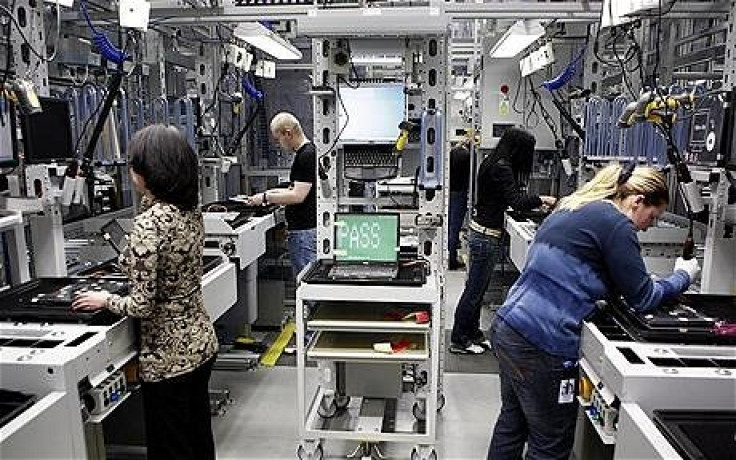UK Manufacturing Continues Decline for Fifth Consecutive Month - PMI

Britain's manufacturers saw sector activity slow for the fifth consecutive month in September, as the ongoing financial crisis in Europe continues to harm business sentiment and exports.
Employment and production fell in the manufacturing sector, reported the monthly Markit/CIPS purchasing managers index (PMI) survey, as input costs spiked off the back of rising commodity prices.
"The UK manufacturing sector has lost momentum again at the end of the third quarter, with firms suffering the double blow of falling output and rising costs," said Chris Williamson, chief economist at survey compilers Markit, which researches data from the private sector.
"Job losses are mounting again as a result. A steep rise in raw material costs does not help, linked to rising oil and agricultural commodity prices in particular, which manufacturers sought to offset by cutting labour costs via job losses."
Manufacturing PMI fell to 48.4 in September, down from August's 49.6. A figure over 50 shows expansion, while anything beneath this mark represents a contraction.
New export orders dropped in September, as slowing demand across the world for the UK's manufactured goods continued to pinch. However new orders at home rose for the second month in a row.
"A bright spot in the survey was an uplift in growth of new orders to the highest since March, which is attributable to domestic demand perking up," said Williamson.
"However, while an improving trend in new order inflows bodes well for production in the coming months, the increase was only very modest due to falling exports. Overseas sales continue to be hit by the ongoing deterioration in global economic growth, with the euro zone - the UK's largest export market - at the epicentre of the weakness.
"In this global economic environment, manufacturers look certain to struggle and the sector is unlikely to act as a driver of economic growth."
British bank RBS put out a note saying that manufacturing sector performance was weaker than expected in September.
"September's decline does not amount to a dramatic change but does signal a further deterioration in the underlying economy," said the RBS note.
"The survey is at levels which historically have been associated with a contraction in manufacturing output and the underlying trend over the past year or so has been downwards.
"None of this should prevent a bounce in Q3 GDP - that is largely a base-effect issue - but, more significantly, will be seen as heightening the risks that a loss of momentum will translate into weak economic growth in Q4."
Bounce expected in Q3 GDP
Many economists expect a significant bounce in GDP for the British economy in the third quarter.
A string of positive data emanating from the economy and the base effect, as a day's lost output from June's Diamond Jubilee bank holiday corrects itself, indicates that the country is emerging from recession.
Bank of England economists say the Jubilee may have dragged on GDP by as much as -0.5 percent in the second quarter.
Britain's economy contracted by -0.4 percent in the three months to June. Initial estimates put the decline at -0.7 percent, but subsequent revisions of the data indicated a better economic picture than thought at first.
Labour market figures show employment hitting its highest rate since April 2009 as it remained robust despite recession.
The employment rate for those aged from 16 to 64 was 71.2 percent, up 0.5 percent on the quarter to July, taking the number to 29.56m people employed.
Output in the UK service sector, which accounts for around three quarters of overall output in the economy, lifted by 1.1 percent in July on the month before.
In the second quarter the service sector had contracted by 0.1 percent, helping to pull the overall output down.
Consumer confidence has also lifted as inflation falls and incomes grow.
Several policy efforts by the government and Bank of England are also taking shape.
The Bank's two credit easing schemes have helped bring down borrowing rates for smaller firms and mortgage-seekers at some of Britain's biggest banks, such as Lloyds and RBS.
Business secretary Vince Cable announced a £1bn state-backed investment bank to support lending to small business.
Activity in the construction sector should also start to pick up with several pushes on infrastructure projects, from a scheme that sees that taxpayer underwrite the finances of major projects struggling to find credit, to a £9.4bn fiscal boost to upgrade the creaking rail network.
---
Follow @shanecroucher
© Copyright IBTimes 2024. All rights reserved.






